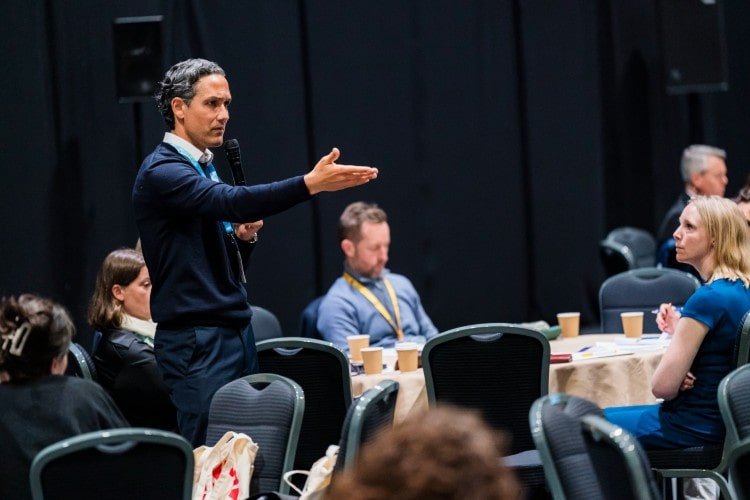Join a collaborative community of people who are passionate about improving health and care
What to expect from the Utrecht 2025 programme
We have put together a programme that shares the latest research on quality and safety improvement, gives you ideas and international perspectives, offers outcomes-focused learning and plenty of opportunities to connect and collaborate during and after the conference.
You can be part of interactive workshops, off-site experience days, structured networking sessions and huddles and more, while interacting with experts from across the health and care sector as well as colleagues and patient advocates from varied backgrounds and unique experiences. But most importantly, you will be able to be part of a powerful and collaborative community of people, passionate about improving outcomes.
Through the 100+ sessions across all 3 days, organised in 7 conference streams, including our new Foundations stream, our key areas of focus will be on:
- Practical outcomes that lead to real-world change
- Involving emerging leaders and the next generation of improvers
- Community engagement
- Equity
- Efficiency
In the programme, you will find:
- 8 Experience days on Wednesday, including 4 hospital site visits, 3 community visits and 1 other industry visit, plus 1 on-site workshop on regulation
- Senior Leaders Programme
- 1 full-day course for Dutch delegates on Wednesday (held in Dutch and taking a deep dive into solving key issues facing the Dutch health and care system)
- 1 full-day course on creating change and 7 other half day workshops on various topics on Wednesday
- 4 keynotes across Thursday and Friday
- Around 70 sessions across Thursday and Friday
- 10 or more country-based huddles across Thursday and Friday
- Over 200 speakers confirmed so far ( with more to come)
- Work presented from over 20 countries, covering Europe, North America, Africa, Australia and Asia
Conference streams
1. Safety
Patient safety in healthcare involves the prevention of harm through the effective mitigation of risk – and incorporating aspects of safety science including human factors. Patient safety also involves learning by investigation, reporting and change after events. Hear about projects that reduce the possibility of harm caused by healthcare, but also submissions from those working in harm and risk reduction in other industries. From technological safety nets to organisational culture improvement, how are we keeping each other safe as we go about the day to day work of delivering healthcare, planning new services and working across professional boundaries.
Stream co-chairs: Ian Leistikow, Aidan Fowler, Ralph So, Desiree Hairwassers, and Maja Troj Larsen
2. People
Hear about improvement projects where health and care professionals are working together with patients, carers or people with lived experience to co-produce a real difference to communities. This includes patient leaders who are creating real improvements to the experience of patient care. Hear from healthcare professionals co-producing with patients, as well as co-production across social care and education sectors to improve health.
Stream co-chairs: Bob Klaber, Suzie Bailey, Maarten van der Laan, Karin Schoonenberg, and Rachel Rajadurai
3. Populations
In this new stream, we are recognising the imperative for healthcare improvement to change to meet the needs of the whole population. Hear about:
- how we can use approaches such as large data sets to understand need and plan care for whole communities, how technology is bringing new challenges and opportunities for scaling care across populations
- the application of improvement approaches work that focuses on a specific population group, health outcomes and health inequalities
- improvement across boundaries and examples of collaborations across organisations and sectors (e.g. health, social care, education)
Stream co-chairs: Dominique Allwood, Vibeke Rischel, Mirella Minkman, Prachi Khanna, and Emily Audet
4. Change
Change is the process by which we make improvement happen. This stream will focus on how we think about change and practical actions that enable change, leading to improvement such as small-scale change initiatives, how can we make change happen across a whole system? How has social movement thinking, complexity principles of appreciative inquiry, implementation science or any other approach been applied to change in health and care?
Stream co-chairs: Helen Bevan, Göran Henriks, Erica de Loos, Esther Greaney, and Gabriel Cenizal
5. Science
This stream will showcase the best work that is applying the science of improvement with high rigour, and advancing the field of improvement science. Hear from those applying good design and evaluation methods in health and care improvement. In this stream, we will define the approaches and methods being applied within health and care to improve quality of care, improve population health, tackle equity and enhance sustainability.
Stream co-chairs: Pierre Barker, Amar Shah, Dave Dongelmans, Stella O’Brien, and Riddhi Shenoy
6. Leadership
Leading for better health is becoming ever more complex and challenging, yet also ever more exciting since we have a constantly-growing base of experience on which to draw. “Leaders” can be health or care professionals, patients, community-leaders or others. What does “leading well” look like today in a complex world with multiple needs and aims? How can leaders encourage progress at one and the same time across all dimensions where results matter: patient outcomes and experience; population health and equity; sustainability/environmental health; cost; staff experience and wellbeing? Hear about creative solutions and strategies which are of practical use to people working toward better health – be they community organisers, ward team leaders or executives in large systems, charities or other organisations. This stream will be developed in partnership with BMJLeader, the journal for evidence and debate in leadership across health and care.
Stream co-chairs: James Mountford, Inge Kristensen, Ellen Joan van Vliet, Birgit Hartoft, and Jamie Smyth
7. Foundations
Our brand new fundamentals of QI stream is a series of practical workshops designed specifically to tackle the most pressing challenges at the heart of our health and care systems today. Join these expert-led sessions to learn the most effective techniques, methods and skills that you need (including PDSA cycles, flow, medication error, data and measurement) to save time, boost morale and create real impact from your improvement work.




